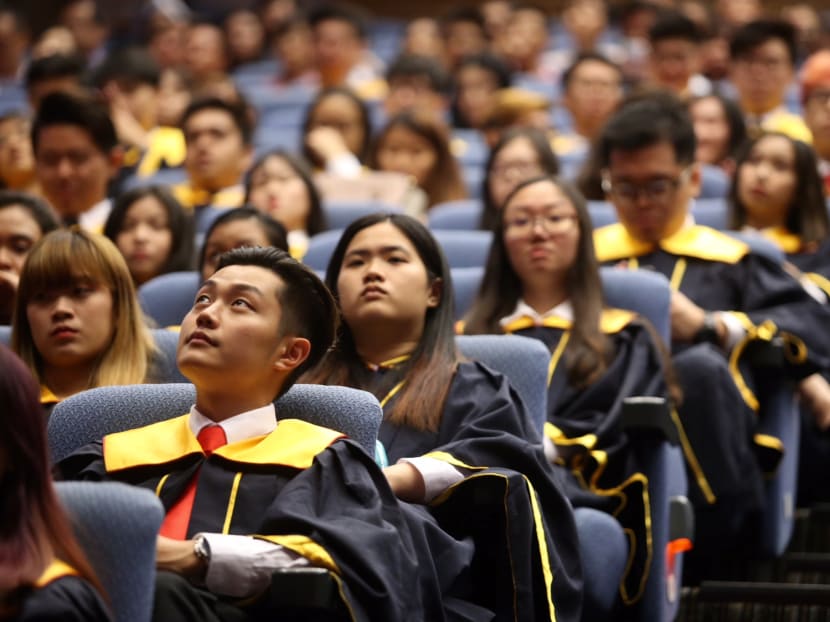Not just As; job experience, aptitude to count for working adults pursuing polys’ full-time diplomas
SINGAPORE — In a move to reduce over-emphasis on academic grades, working adults looking to pursue full-time diploma courses at local polytechnics will soon be assessed on their job experience and aptitude, instead of just their past academic scores.

Students from Singapore Polytechnic at their graduation ceremony. Working adults looking to pursue full-time diploma courses at local polytechnics will soon be assessed on their job experience and aptitude, instead of just their past academic scores.
SINGAPORE — In a move to reduce over-emphasis on academic grades, working adults looking to pursue full-time diploma courses at local polytechnics will soon be assessed on their job experience and aptitude, instead of just their past academic scores.
This was announced by Education Minister Ong Ye Kung at the Institute of Technical Education (ITE) graduation ceremony at the ITE College Central on Tuesday (Jul 03)
Mr Ong said the Ministry of Education (MOE) is looking to reduce the “chasing of marks” throughout the education system.
While part-time courses at the polytechnics currently evaluate applicants based on their work experience, full-time courses are primarily focused on academic results.
That is set to change, as Mr Ong said these results “were attained years ago and do not fully reflect the current eligibility of the adult applicants”.
By the next academic year, working adults applying to polytechnics through the Direct Admissions Exercise (DAE) will be evaluated on their relevant work experience and performance, on top of their past academic results.
The polytechnics will ramp up the use of interviews and “other holistic assessments” during this exercise, said Mr Ong.
Working adults will also be able to apply for full-time diploma courses through the polytechnics’ Early Admissions Exercise (EAE) for the 2020 academic year. This exercise is currently only open to the graduating cohort of O-level and ITE students.
Applicants will be also be assessed based on their suitability for the course, and due consideration will be given to those with relevant work experience.
The EAE is a centralised aptitude-based admissions exercise where applicants are assessed on their demonstrated interest and aptitude for their chosen courses. The selection process may involve interviews and portfolio submissions, and consideration is given to the students’ talents and achievements in other areas such as sports, arts, leadership and community service.
More places will be added for the EAE so that O-level and ITE students are not affected by the decision to open up places for working adults, said the MOE. More details will be released closer to the start of the exercise for the 2020 academic year.
Working adults applying for places via both exercises will generally need to have at least two years of work experience to be considered.
ITE graduates who are already in the workforce can also enroll in the ITE Work-Learn Technical Diploma programme, which allows them to work and study at the same time.
The diploma programme, which started in April, has 114 trainees across its four courses in marine and offshore engineering, mechanical and electrical services supervision, rehabilitation care and security systems engineering.
ITE plans to launch another tranche of courses next year, said Mr Ong, as he encouraged employers to step forward to partner ITE in the programme.
Mr Ong added the programmes will ensure that “there is no rush for those of you who are interested in further studies”.
“Work in the area that you are trained in, get some relevant experience, and be sure that this is what you want to do,” he said.
“You can come back to the polytechnics later to deepen your skills – whether on a full-time or part-time basis, or you can come back to ITE to get a Work-Learn Technical Diploma.”
Mr Ong also said on Tuesday that they are “transforming the approach to admission to ITE”, and that aptitude and interest, rather than solely results, are “important motivations” in the pursuit of a craft or vocation.
As a result, the 50 per cent course level cap for ITE’s EAE intake will be removed from the 2019 academic year to allow the institutes more flexibility to select students with demonstrated interests and aptitudes.
Admission through the Joint Intake Exercise – which Mr Ong acknowledged is largely based on academic grades and is not ideal – will also assess the student’s skills and aptitude, on top of his or her academic grades. This will start with the exercise in December.
About half of the ITE courses will adopt such aptitude screening for applicants, said Mr Ong.






